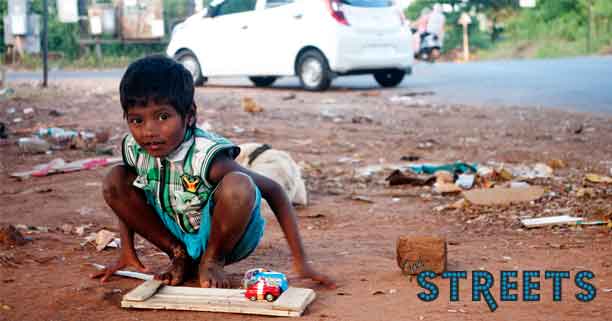A child on the side of a road plays with make-shift toys
Goa’s Forgotten Children
This could well be Pavitra Vasvani’s last year in school. Eleven years old and fortunate to be studying in Std VII Lourdes Convent High School in Saligao, sickness this daughter of a daily wage labourer from Bihar knows that going back to her village will mean the end of her education.
Teary eyed, discount the dark complexioned girl approaches her favourite teacher to break the shattering news. “My father has said that next year onwards we have to go back to the village in Bihar,” she says, presaging the end of a dream. Unlike many of her peers from impoverished states like Uttar Pradesh, Bihar and Odisha, not only was she getting an education but also one in a relatively good school not too far from home.
“My mother and me agree that we should stay back because Goa is a much better place to live in, but my father disagrees. He says that we cannot stay here longer because the work is irregular,” she said.
That Pavitra had any education at all put her in an elite group among the children of migrant workers. A study conducted by the Sarva Shiksha Abhiyan, a government programme to ensure education for all, identified 1,134 out-of-school children during the last academic year. The NGO Children’s Rights Goa believes that official figure is too low, and that the actual number of children out of school could well be in the thousands.
Overall, Goa has about 3 lakh school aged children, and the SSA found that nearly all the children of native Goans are in fact enrolled. The issue, then, is almost completely confined to the children of migrants.
A visit to a small slum at Khobra Vaddo in the heart of Calangute tells this side of the story. Here the first thing that grabs you is the sight of children wandering about. If you take into account the disease and poverty they’re exposed to, in some of ways lack of education is just another malady on the list.
Families here are divided into two categories – those who stay throughout the year cleaning houses, tending gardens and the like; and those employed in shacks, tourism establishments and construction sites who are here only briefly.
Baby Jai, is one such lady who travels where work is and has no fixed address. Hailing from Orissa, she says that “there really isn’t any point putting her two young kids in school” because they will be moving on soon enough.
She offers another more disturbing reason. “The schools here say that the admissions are full and our kids remain left out.” While there is evidence to support the notion that some schools are turning kids away, it’s also true that many migrant families simply can’t be bothered with the paperwork. While government schools in villages do admit the children of migrant workers, it’s not clear what percentage of the migrant kids are actually enrolled.
The Salesians of Don Bosco run a mobile school which caters to about 300 migrant kids. The bus moves from place to place where the children are located; it stays at each site for about three hours before moving to the next location.
Baby Jai, a seasonal visitor to the state, says she comes from an agricultural family who work in the fields during the monsoons. Once the harvest is done, she travels in search of work to supplement the family’s meagre agricultural income.
To be sure, not all these workers are here to work. Take the case of Sakkubai Kale, a middle aged migrant arrested on Dec. 14 after being found begging with a child in Calangute. The child was sent to a protective home for children in Merces, while the woman was discovered again begging outside Tito’s nightclub three days later.
Of course it’s not just the children of migrants who are vulnerable in Goa. One teacher I spoke to who didn’t want to give his name to protect his privacy complained that many of his male students sleep in class, or worse, don’t show up at all.
“At first this puzzled me, after making a few inquiries what I heard shocked me – they tell me they go for ‘catering’,” he says, using the term to describe how the students moonlight as waiters at wedding and other parties that are never in short supply in a state whose USP is its party life.
“I do not have a problem if they are earning a little pocket money while still in school. The problem that is simmering is that of children taking to alcohol while still in their teens,” the teacher said. “It’s a problem that is outside the news, but is one that is bigger than most would expect,” he said.
While at the national level employing children under 14 years of age is a crime, several states have raised that figure to 16 or in some cases to 18. In Goa, the age limit is 14 as defined under the Goa Children’s Act.
And then there’s the case of the stepfather in the North Goan village of Colvale who decided to remove his two stepsons – aged seven and nine – from a church-run primary school. Case workers suspect this man simply wants these kids out of the way, as they’re from a previous marriage and his wife and he now have a one year old and one month old baby of their own.
“He said he wanted to put them in a boarding, but when I asked him to get me a letter from the boarding school where he is due to admit his kids, he had no answer,” said Alvito Cardozo, the school’s director. “Unless he can prove to me that he is continuing with his step children’s education, I will not allow them to be removed.”
Explained Suzan D’Souza, coordinator of Childline, a public-private initiative that aids vulnerable children: “These kids are not his own, and he is literally giving them step-fatherly treatment… The two kids’ of the woman’s earlier marriage are being neglected.”
Nishta Desai, head of the NGO Children’s Rights Goa said the government needs to be far more proactive in enforcing its own Right to Education Act, which stipulates that all children must be schooled.
“There is also a need to place responsibility on others as well such as contractors/house owners renting out rooms (to migrant familes),” Desai said.
The Goa Children’s Act stipulates that crèches, or educational centres, be established at worker employment sites “to the maximum extent of available resources”. Few, however, are actually built.
Dr Samira Kazi of the government’s Goa State Commission for Child Rights did not answer or return calls for questions on her agency’s work in mitigating the plight of Goa’s vulnerable children.
____
If you know of vulnerable children in need of help, call the hotline 1098 or contact Children’s Rights Goa at +91 9822983336




